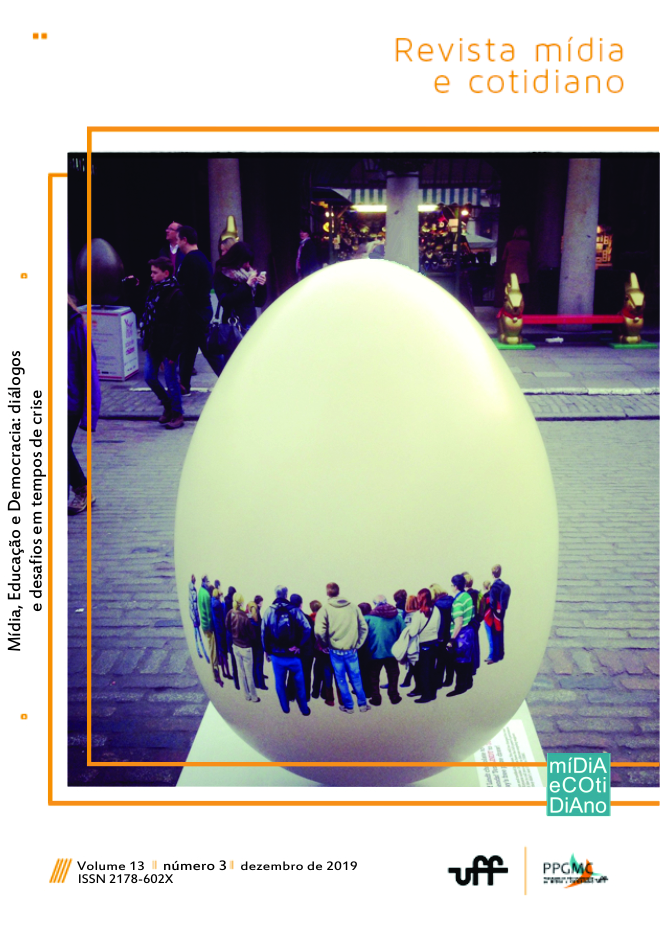Crise epistemológica e teorias da conspiração: o discurso anti-ciência do canal “Professor Terra Plana”
DOI:
https://doi.org/10.22409/rmc.v13i3.38088Resumo
Este artigo pretende analisar a construção de autoridade científica em vídeos do YouTube de teoristas da conspiração que defendem que a Terra é plana. Analisaremos aqui como a cultura de teorias da conspiração é diretamente ligada ao enfraquecimento das instituições da modernidade. Debateremos o papel das políticas do YouTube como distribuidor deste conteúdo e usaremos o canal brasileiro Professor Terra Plana para exemplificar estas práticas.
Downloads
Referências
AARTS, Kees e VAN DER KOLK, Henk Understanding the Dutch ‘no’. The Euro, The East and the elite. PS: Political Sciences and Politics 39(2): 243-246, 2016
AUPERS, Stef. ‘Trust No One’: Modernization, paranoia and conspiracy culture. European Journal of Communication 27: 22, 2012.
AZARIAS, Wiverson. “Não confie em ninguém”: teorias da conspiração como mitologia política, Alabastro, ano 3, vol 2, n 6, 2015.
BAUDRILLARD, Jean. Simulacra and Simulations. Ann Arbor: Univesrity of Michigan Press, 2000
BECK, Ulrich. Risk Society: Towads a New Modernity. London, Sage, 1992
BOYD-BARRETT, Oliver. Fake News and ‘RussiaGate’ discourses: Propaganda in a post-truth era. Journalism 20(1): 87-91. 2018
DAHLGREN, Peter. Media, Knowledge and Trust: The Deepening Epistemic Crisis of Democracy. Javnost: The Public 25(1-2): 20-27. 2018.
DOVEY, Jon. Freakshow: First Person Media and Factual Television. London. Pluto Press. 2000
GARWOOD, Christine. Flat Earth: The History of an Infamous Idea. Macmillan, 2007.
GILLESPIE, Tarleton. The politics of “plataforms”. New Media & Society, 12(3) – 347-364, 2010
GIDDENS, Anthony. Modernity and Self-Identity: Self and Society in the Late Modern age. Stanford, CA: Stanford Univesity Press. 1992.
HABGOOD-COOTE, Joshua. Stop talking about fake news! Inquiry 62 (9-10): 1033-1065. 2019.
KEELEY, Brian. Of Conspiracy Theories. The Journal of Philosophy. No. 96.P. 109-126. 1999.
KNIGHT, Peter. Conspiracy Culture: From Kennedy to the X-Files. London and New York: Routeledge. 2000.
LASCH, Christopher. The Culture of Narcisism. New York: WW Norton and Company, 1979
MANHEIM, K. Man and Society in an Age of Reconstruction: Studies in Modern Social Structures. London, Kegan Paul, Trench, Trubner and Co. Ltd, 1946 [1935]
LILLEKER, Darren G. Politics in a Post-Truth Era. International Journal of Media and Cultural Politics 14(3): 277-282. 2018.
NICOLAS, Loic. As Teorias da Conspiração Como Espelho Do Século: Entre a Retórica, A Sociologia e a História das Ideias. EID&A – Revista Eletrônica de Estudos Integrados em Discurso e Argumentação, Ilhéus, n: 12. Jul/dez 2016.
PARKS, Lisa. Flexible Microcasting: Gender, generation and television-Internet convergence. L. Spigel and J. Olsson, eds. Television after TV: Essays on a Medium in Transition. Durham: Duke University Press, 133-56. 2004.
SILVA, Sandra. Teorias da conspiração: Sedução e Resistência a partir da Literacia Midiática, 87 f. Dissertação (Mestrado em Ciências da Comunicação). Faculdade de Letras da Universidade de Porto, Porto 2010
SOUKUP, Charles. Television viewing as vicarious resistance: The X-Files and conspiracy discourse, Southern Communication Journal, 68:1, 14-26. 2002.
TANDOC Jr, Edson C.; LIM, Zheng Wei & LING, Richard. Defining “Fake News”: A typology of scholarly definitions. Digital Journalism 6(2): 137-153. 2018.
VAN ZOONEN, Liesbet. I-Pistemology: Changing truth claims in popular and political culture. European Journal of Communication 27(1) 56-67. 2012
VAN DJICK, José. The Culture Of Connectivity: A Critical History of Social Media. Oxford University Press, 2013
WOOD, Max. Has the internet been good for conspiracy theorizing? PSYPAG Quaterly, Special Issue: The psychology of conspiracy theories, Issue 88 September 2013.
WEBER, Max. Science as a vocation. In: Gerth HH and Mills CW (eds). From: Max Weber: Essays in Sociology. London, Routeledge, pp 129-156. (1948 (1919).
Downloads
Publicado
Edição
Seção
Licença
Aviso de Direito Autoral Creative Commons
1. Política para Periódicos de Acesso Livre
Autores que publicam nesta revista concordam com os seguintes termos:- Autores mantém os direitos autorais e concedem à revista o direito de primeira publicação, com o trabalho simultaneamente licenciado sob a Licença Creative Commons Attribution que permite o compartilhamento do trabalho com reconhecimento da autoria e publicação inicial nesta revista.
- Autores têm autorização para assumir contratos adicionais separadamente, para distribuição não-exclusiva da versão do trabalho publicada nesta revista (ex.: publicar em repositório institucional ou como capítulo de livro), com reconhecimento de autoria e publicação inicial nesta revista.
- Autores têm permissão e são estimulados a publicar e distribuir seu trabalho online (ex.: em repositórios institucionais ou na sua página pessoal) a qualquer ponto antes ou durante o processo editorial, já que isso pode gerar alterações produtivas, bem como aumentar o impacto e a citação do trabalho publicado (Veja O Efeito do Acesso Livre).


